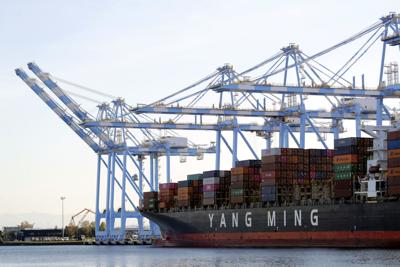
Everyone knows that goods made in China have a massive hold on what Americans buy. Now China wants the world to be dependent on them for how things are delivered, as well as how they are made.
The closest parallel is the explosive growth of Amazon, with its mastery of logistics to dominate delivery as well as dominating sales.
FedEx once owned the slogan, “When it absolutely, positively has to be there overnight.” Jeff Bezos studied, learned and prepared, then ended Amazon’s partnership with FedEx so that we now associate quick delivery with Amazon, which has built a fleet of jets and 60,000 delivery trucks (plus 100,000 more on order). This has made Bezos the richest man in the world.
China meanwhile would like its Communist system to replace the United States as the richest economy in the world and dominating delivery is its new objective. Rather than trucks and airplanes, they’ve realized that 90 percent of global trade moves by ship and that is where they have shifted their focus.
The Chinese have a worldwide plan to take control of the logistics of global trade as part of their mega-billion Belt and Road Initiative and to push aside competitors in the process. In 2013, President Xi Jinping announced the initiative that now involves acquiring road, rail and maritime infrastructure in 138 countries, including ports on every continent except Antarctica, facilities at both ends of the Panama and Suez Canals and control of other global chokepoints.
To describe how “How China Rules the Waves,” The Financial Times listed scores of global ports where China has paid tens of billions to buy control. A headline in Forbes warned, “China’s Seaport Shopping Spree: What China Is Winning By Buying Up The World’s Ports.” And a new report by the bipartisan Center for Strategic & International Studies states it as follows:
Chinese companies are increasingly dominant across the entire global maritime supply chain, controlling the world’s second-largest shipping fleet by gross tons and constructing over a third of the world’s vessels in 2019.
They also produce 96 percent of the world’s shipping containers . . . and own seven of the ten busiest ports in the world . . . [with] state-owned China Merchant Group the largest port and logistics company in the world.
In short, America is being pushed out of trade on the high seas. Only 182 American ships are among the 41,000 ocean-going cargo ships today. Of 2,900 such ships now under construction, the U.S. is only building eight. China is building 1,291.
Incredibly, some now propose that we allow China to take over our domestic water routes as well. Fortunately, we still control our domestic waters – our coastlines, rivers, harbors and the Great Lakes – where 40,000 vessels handle U.S. internal trade. China cannot barge in thanks to the Jones Act, a 100-year-old law requiring domestic shipping to use vessels that are American-built, -owned, and -crewed.
Yet some groups clamor to repeal the Jones Act, saying we can get cheaper prices if we invite in other countries like China. If they succeeded, then the next proposal might be to change our laws that won’t let foreign airlines take over domestic air travel. (They can only connect between a foreign city and an American city). After that, they might ask that foreign trucks be permitted to deliver goods into our heartland and not just to border areas. To these advocates, national security and the national interest is a non-factor – it’s only about “saving money.”
Why can China undercut costs? It uses a different system of values. Hidden government subsidies, slave labor, having their People’s Liberation Army operate supposedly-private enterprises, industrial espionage, disregard for intellectual property rights, far fewer government regulations of labor, public safety, and environment, and of course human rights violations and suppression of free speech like in Hong Kong and Tiananmen Square. As China enters a new phase – not only to make us dependent on their products but also to depend on them to transport and deliver our needs – we must be careful not to let them take advantage of us.
Yet this is forgiven by some policy experts who treat it like laissez faire economics, rather than acknowledging that it is not a free market but part of China’s government-run plan. After all, if only money matters and not American values, we can ignore whether foreign powers gain control over us, whether it be China, Russia or any other nation.
A Frontiers of Freedom white paper I recently authored provides a more detailed warning of this issue, but the core message is simple: money isn’t everything. Our national security is also important, both to protect America’s values and to guard against the continuing viral growth of China’s plan.